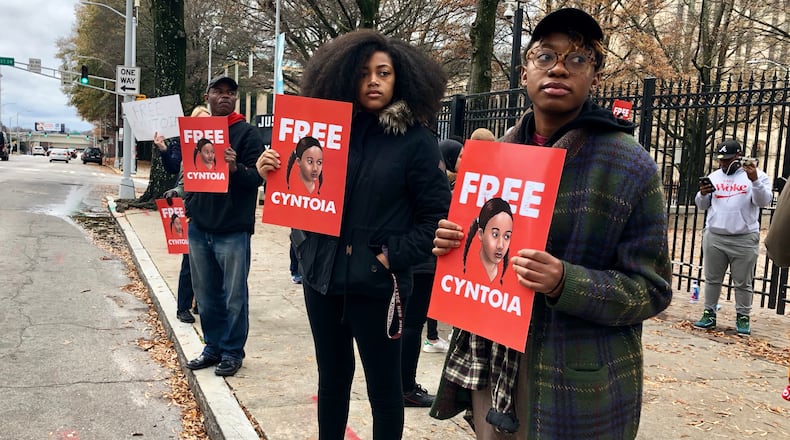A few dozen activists gathered at the state Capitol in Atlanta on Saturday afternoon to urge the governor of Tennessee to grant clemency to a woman sentenced to life in prison for a crime that occurred when she was 16.
Cyntoia Brown has said she was forced into prostitution as a minor and she shot and killed 43-year-old Johnny Allen in 2004 while in fear for her life. Brown, whose case has attracted international attention, has said her then-boyfriend pushed her into prostitution, and advocates say she was the victim of physical abuse and sex trafficking.
Brown, who prosecutors said attempted to rob Allen, was convicted on charges of first-degree murder and robbery in 2006.
Legal advocates have attempted to appeal her punishment. Brown isn't eligible for parole until she's served 51 years, the Tennessean newspaper has reported.
Her lawyers also have sought a new trial based on new evidence, including that she suffered from fetal alcohol syndrome, according to the Tennessean.
Brown’s cause has been championed by advocates for sex trafficking victims and by celebrities including Kim Kardashian West.
At the rally in downtown Atlanta, demonstrators held signs reading “Free Cyntoia” and “Clemency 4 Cyntoia,” and speakers said they gathered in solidarity with Brown’s supporters in Nashville and other victims of sex trafficking.
An affiliated group from Atlanta traveled to Nashville on Friday to rally on Brown’s behalf, an organizer said.
Leea Allen, a Baptist minister, said Brown was victimized not only by Allen, who allegedly picked up the minor for sex, but by a criminal justice system prejudiced against people of color.
“We are demanding that our sister Cyntoia be set free,” she said.
According to the Tennessean, Allen did not know Brown when he picked up the teen from a restaurant in the Nashville area and took her to his house. Brown has denied she tried to rob Allen and said she shot the man, who was lying naked beside her, because she thought he was reaching for a gun, the newspaper reported.
Brown, now 30, has obtained an associate’s degree from a Tennessee college while in prison, and she has been the subject of a PBS documentary.
Earlier this month, the Tennessee Supreme Court ruled in a unanimous decision that people convicted of first-degree murder in that state and sentenced to life as of July 1995 must serve at least 51 years before becoming eligible for parole, the Tennessean reported.
Democrats in Tennessee have pushed for the state's Republican governor, Bill Haslam, whose term ends next month, to commute Brown's sentence, according to the Tennessean. Haslem has said he will decide whether to grant Brown clemency before leaving office.
About the Author
Keep Reading
The Latest
Featured



